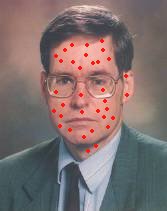November 2001
Sessions of Mass Instruction
By Michael J. Katin, MD
I would like to report that there were dozens of concerned inquiries regarding the absence of the November column as of November 10. That actually wouldn't be true, although at least there was one, and that was from the webmaster. There was an excellent reason for the delay, however--to allow coverage of a late-breaking story, namely, the impact of the war on terrorism on the 43rd annual meeting of the American Society for Therapeutic Radiology and Oncology.
It can be generalized that there are two types of people in our specialty: those who go to the ASTRO meeting, and those who resentfully stay at work and cover for those who do. The only thing that prevents open hostility is that there is some cross-exchange between these groups. This year was somewhat unusual. In a new spirit of cooperation and siblinghood many people who were planning to attend the ASTRO meeting in San Francisco were willing to give up their slots to their associates. This was probably not in any way related to the warning by Governor Gray Davis of California of the possibility of terrorist attacks on the West Coast between November 2 and 7.
Or was it a coincidence that the period of the threat overlapped the ASTRO meeting? There had already been a substantial threat to this year's meeting, which fortunately did not materialize. A major food safety organization had announced perfection of a device to detect manure on beef carcasses heading for supermarkets, intended to reduce the risk of bacterial contamination of food products. There were unsubstantiated rumors that these devices would be installed at the entrance to each meeting room at future national medical conferences, with the potential to dramatically disrupt presentation of abstracts, refresher courses, and even plenary sessions. Fortunately, the Federal Government moved in to suppress deployment of these devices, considering the substantial risk to conduct of business in Washington if they were to come into general use.
But now there was a more substantial threat and regardless members of ASTRO poured into San Francisco, willing to take a chance on the mean streets. And there was no question the city was on edge, wondering what to expect in terms of conventional, chemical, or biological attacks. Shortly after one of my colleagues left a candy store on Market Street it was overrun by officials in decontamination suits. In retrospect, he may have contributed by telling the salesperson that he needed to buy more chocolates, even though he already had a small box.
This was similar to the time our office was cleared out for two days after we were suspicious there was an ant colony in the employee lounge and I said I knew they were there since I saw the ant tracks.
It was heart-warming to watch thousands if not hundreds of ASTRO members trying to maintain normal activities in the face of danger, attending the sessions, dining at world-class restaurants, and participating in the vendor receptions, knowing that their associates who stayed behind to work would be proud of their bravery. Fortunately, nothing happened. But each time the guard dogs moved through the Moscone Center, other than wondering which ones of them would wind up on the receiving end of a radiosensitizer project, I couldn't help but reflect on the reason that ASTRO had been at risk.
Was it because ASTRO was misinterpreted as being an aerospace organization associated with our military effort? Was it because wiping out half the readiation oncology personnel in the country would substantially affect delivery of health care? None of the above. The main goal was to prevent presentation of Poster 2085, knowing that the ramifications of this discovery could eventually result in protection of our society from hostile threats of radiation exposure once and for all. Thank goodness the terrorists didn't succeed.
email: mkatin@radiotherapy.com
